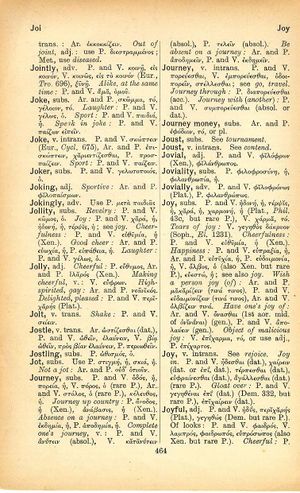joy
Δεῖ τοὺς μὲν εἶναι δυστυχεῖς, τοὺς δ' εὐτυχεῖς → Aliis necesse est bene sit, aliis sit male → Die einen trifft das Unglück, andere das Glück
English > Greek (Woodhouse)
substantive
P. and V. ἡδονή, ἡ, τέρψις, ἡ, χαρά, ἡ, χαρμονή, ἡ (Plato, Philoctetes 43C, but rare P.), V. χάρμα, τό.
tears of joy: V. γεγηθὸς δάκρυον (Soph., Electra 1231).
cheerfulness: P. and V. εὐθυμία, ἡ (Xen.).
happiness: P. and V. εὐπραξία, ἡ, Ar. and P. εὐτυχία. ἡ, P. εὐδαιμονία, ἡ, V. ὄλβος, ὁ (also Xen. but rare P.), εὐεστώ, ἡ; see also joy.
wish a person joy (of): Ar. and P. μακαρίζειν (τινά τινος). P. and V. εὐδαιμονίζειν (τινά τινος), Ar. and V. ὀλβίζειν τινά.
have one's joy of: Ar. and V. ὄνασθαι (1st aor. mid. of ὀνινάναι) (gen.), P. and V. ἀπολαύειν (gen.).
object of malicious joy: V. ἐπίχαρμα, τό, or use adj., P. ἐπίχαρτος.
verb intransitive
See rejoice.
joy in. P. and V. ἥδεσθαι (dat.), χαίρω, χαίρειν (dat. or ἐπί, dat.). τέρπεσθαι (dat.), εὐφραίνεσθαι (dat.), ἀγάλλεσθαι (dat.) (rare P.).
gloat over: P. and V. γεγηθέναι ἐπί (dat.) (Dem. 332, but rare P.), ἐπιχαίρειν (dat.).

